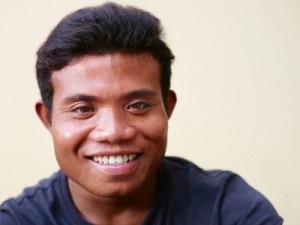 EXAMPLE: Person-Centered Practices and Families
EXAMPLE: Person-Centered Practices and Families
Steven’s and His Mother’s Story
One Personal Futures Planning facilitator was very worried. The person’s mother was not saying anything at all during the Personal Futures Planning meeting. This was a mother that had often been very vocal about her views. The facilitator was concerned that she might be upset.
They talked afterward, and the mother assured the
facilitator that anger was not the reason she hadn’t said anything. She had been incredibly moved when people in the group shared their dreams and visions for her son. She said, “I was so emotional that I couldn’t talk. I never thought people had those dreams for Steven.”
Tony’s Story
Tony is a 21-year-old young man. He is bright, inquisitive, and handsome. He has many varied interests. He is a person with intellectual disabilities and a severe seizure disorder. Tony lives at home with his parents and two siblings. His developmental delay was noticed at age four. He received a lot of medical attention for most of his life to control his seizures.
Tony is also has difficulty with changes. He has been at the same school for 15 years. He prefers the same schedule and structure every day. As Tony and his family prepared for graduation, they began to question how Tony was going to transition to a program for adults. His parents have been very supportive his whole life. They were very worried about Tony’s future.
Tony’s Personal Futures Planning meetings were attended by his parents, teacher and teacher assistant, and county social workers. These meetings centered on what Tony was going to do after school ended:
- Were his parents going to keep him at home?
- Should he go to a day program?
- If so, which one, and how should the transition be handled?
Although Tony traveled from his school program to a community work-site, the group decided that Tony should see more community-based work and recreation locations.
As a result of the Personal Futures Planning meetings, Tony’s parents addressed their concerns about Tony’s transition to adult programs. In the last year of school, they toured three different programs. After many of these tours, they told Tony’s teacher how much they hated them. They cried after some of the tours. It was difficult to face this change. With his school, Tony also visited several community-based work sites.
Tony’s parents began to give Tony more options at home with his food, clothes, and activities. With these small changes, they started to see Tony as more capable and independent.
Tony’s parents began to ask more questions. They also learned how to contact Tony’s social worker when they needed more information. Tony went through a thorough transition program. This enabled him to become comfortable with major changes in his life. Although it was difficult, Tony’s parents also felt the Personal Futures Planning process was helpful. It assisted them in making important decisions for their son. They felt they received support to do things in his best interest that included his input.

